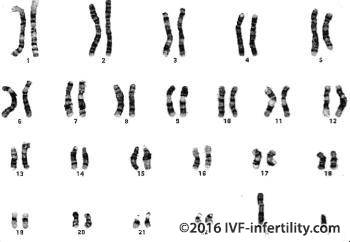Genetic Screening
This includes genetic screening for chromosome count and structure, Y chromosome microdeletion and cystic fibrosis gene mutations. These screening tests are recommended for men with no sperm (excluding those who have no sperm because of vasectomy) or have a severely low sperm count (count of less than 5 million per ml).
Approximately 40-70% of these infertile men are carriers of cystic fibrosis and about 10-15% have Y-chromosome microdeletion, the gene responsible for sperm production is stored in the long arm of the Y chromosome. The overall frequency of chromosomal abnormalities among infertile men is about 7% compared to less than 1% among fertile men. Klienfelter's syndrome accounts for about two thirds of chromosomal abnormalities. Men with balanced translocations have an increased risk of having chromosomally unbalanced offspring.
If both partners carry the gene for cystic fibrosis, there is one in four chance that their child will have the full-blown disease. This is an unpleasant disease, affecting lungs and digestive system, and there is currently no cure for it. There are many hundreds of mutations of the cystic fibrosis gene, and laboratories can currently only screen the most common of these. So, a negative screening test indicates a very low, but not zero, risk of pregnancy being affected by cystic fibrosis. If a man has a Y chromosome microdeletion, there is a risk of passing on the abnormality to his son, and thus also passing on the potential risk of infertility.
Failure to detect cystic fibrosis gene mutations does not rule out the presence of a mutation currently unidentified by routine testing methods. Similarly, a negative Y chromosome microdeletion test does not necessarily rule out a genetic abnormalities because there may be other unknown genes that might also be necessary for sperm production.
